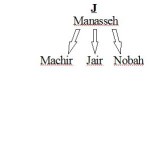Numbers 33 displays the mark of a later tradition that was composed and inserted here in the narrative as a sort of summary to the Wilderness itinerary. It exhibits a number of stylistic features only found in the Priestly source and scholars assign it to a redactional layer by this Priestly tradition. Yet, as we shall see in the forthcoming contradictions, its itinerary is often at odds with the scattered itineraryRead More
#324. Did the Israelites completely destroy the cities of the kingdoms of Sihon and Og and all of Gilead OR not? (Num 32:16-17, 32:24; Deut 2:33-36, 3:3-6 vs Num 21:25, 32:26, 32:33)
#325. Did the Israelites completely annihilate all the indigenous of these lands OR not? (Num 21:32-35; Deut 2:33-36, 3:3-6 vs Num 32:17; Josh 13:13)
Not only are there variant traditions in the Torah that talk about when these Transjordanian territories were conquered and by whom (#317-318)—and even if there was a Transjordanian conquest (#282-285)—but there are also variant traditions describing what happened to the land’s cities and inhabitants. Were these cities utterly destroyed or did the Israelites simply “move in” to them? Likewise, were the inhabitants completely wiped out or were there still remnants of themRead More
#323. Did Moses give the children of Gad, Reuben, and the half tribe of Manasseh their Transjordanian possessions before the conquest of Canaan OR were Eleazar and Joshua to give it to them after the conquest? (Num 32:33; Deut 3:12; Josh 1:15, 13:8 vs Num 32:28-29)
This contradiction is rooted in variant textual traditions that were brought together during the Torah’s redaction. Not surprisingly, the only tradition that claims that these Transjordanian possessions will be assigned to the children of Reuben and Gad by Eleazar and Joshua after the conquest of Canaan is also the same tradition that assigns conditions to the granting of these possessions, which were discussed in the previous entry (#322)—the Priestly source. So the conditionsRead More
#322. What would have been the punishment for the children of Reuben and Gad if they had not crossed over the Jordan armed with the rest of Israel: sin OR a possession in Canaan rather than Transjordan? (Num 32:23 vs Num 32:32)
Numbers 32:23 and 32:30 introduce two very different types of punishments that the children of Reuben and Gad are to suffer if they refuse to crossover the Jordan armed with the rest of the Israelites and assist in the conquest of the land of Canaan. To some extent these difference can be minimized by looking at the two different addressees: in verse 23 Moses informs the Reubenites and Gadites that they will “sinRead More
#321. Is Caleb a Judahite OR Kenizzite? (Num 13:6, 34:19 vs Num 32:13; Josh 14:6)
The Torah bears witness to some conflicting and contradictory information concerning Caleb’s genealogy. Was he a Judahite or a Kenizzite? And why was there some confusion over Caleb’s genealogy? What was the relationship between the sons of Judah, a son of Jacob, and the sons of Kenaz (from which the Kenizzites emerge), a grandson of Esau (Gen 36:11). While scholars don’t have any clear answers to these questions, we might infer that this conflatingRead More
#319. Is Jair Manasseh’s son OR great-grandson? (Num 32:41; Deut 3:14 vs 1 Chr 2:22)
#320. Is Gilead a personal name OR a toponym? (Num 26:29-30, 36:1, 1 Chr 7:14-19 vs Num 32:39-42)

This contradiction could just as well have been titled: Two variant traditions on how to legitimate the possession of Gilead. If we compare the genealogies of Manasseh’s sons as portrayed in Num 26:29, 36:1, Josh 17:1, and 1 Chr 2:21-22 (P) with that of Num 32:39-42 (J) we notice some interesting discrepancies. Not surprisingly, these variant genealogies have their origins in two different traditions: the former list of passages come fromRead More
#317. Was Gilead conquered during the Transjordanian conquest OR during its allotment to the children of Machir?
#318. Who conquered Gilead: the Israelites OR the Machirites? (Num 21:31-35, 32:1-5; Deut 2:32-37, 3:4-10 vs Num 32:39-42)
Continuing from the previous entry (#315-316), there are other contradictions created in Numbers 32 when the Machirite tradition (Num 32:33-42) was appended onto the end of this chapter—a chapter that had up until this point not spoken of nor known about the allotment of land to the half-tribe of Manasseh, the children of Machir. Another new and contradictory element that this passage brings to the now composite text of the TorahRead More